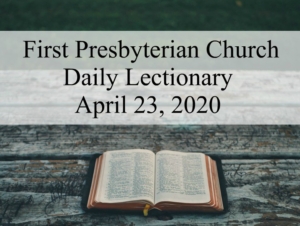
Second Reading 1 Peter 2:11-3:12
11Beloved, I urge you as aliens and exiles to abstain from the desires of the flesh that wage war against the soul. 12Conduct yourselves honorably among the Gentiles, so that, though they malign you as evildoers, they may see your honorable deeds and glorify God when he comes to judge.
13For the Lord’s sake accept the authority of every human institution, whether of the emperor as supreme, 14or of governors, as sent by him to punish those who do wrong and to praise those who do right. 15For it is God’s will that by doing right you should silence the ignorance of the foolish. 16As servants of God, live as free people, yet do not use your freedom as a pretext for evil. 17Honor everyone. Love the family of believers. Fear God. Honor the emperor.
This truncated version of the 1 Peter passage has been a trip hazard for many. Peter writes to exiles, people for whom the political arrangements of the day do not work, and yet he commends their obedience to the state: “Fear God, Honor the emperor.” The passage is not beloved by revolutionaries or reformers. It raises concern for us when we worry about the ineffective response of government to the challenges of the day, especially when so many suffer as a result of negligence or intentional policy. How do we honor the emperor then? The answer to the challenge comes in two forms. First, Peter prioritizes our relationship with God, the source of our ultimate authority. He recalls a passage from Matthew, where Jesus warns his disciples not to fear those who can control the body, but the one who controls the destiny of the soul. When our civic and religious duties conflict, then, we have clear guidance where our allegiance lies. The second answer is that our civic action should reflect what’s best about us. The people of God are conscientious and obedient citizens, caring for everyone’s welfare because that is the best witness we can offer to a God who died for all. This is why our self-isolation and altered worship isn’t turning our back on God, but an expression of loving our neighbor. This is the true exercise of our freedom: caring for others. “As servants of God, live as free people, yet do not use your freedom as a pretext for evil.”
Holy God, all that we have belongs to you. We thank you for the gift of freedom, which is given through the love of Jesus Christ and the way he offers. Help us to walk his way with humility, showing that love of the cross, through which Christ redeemed the world. We pray in his name. Amen.
